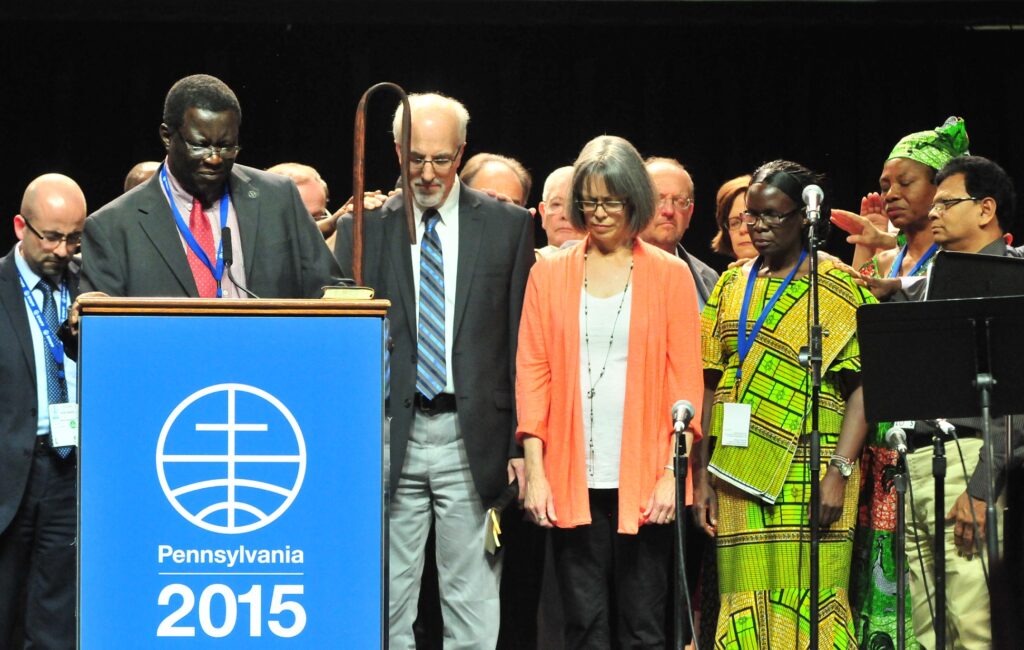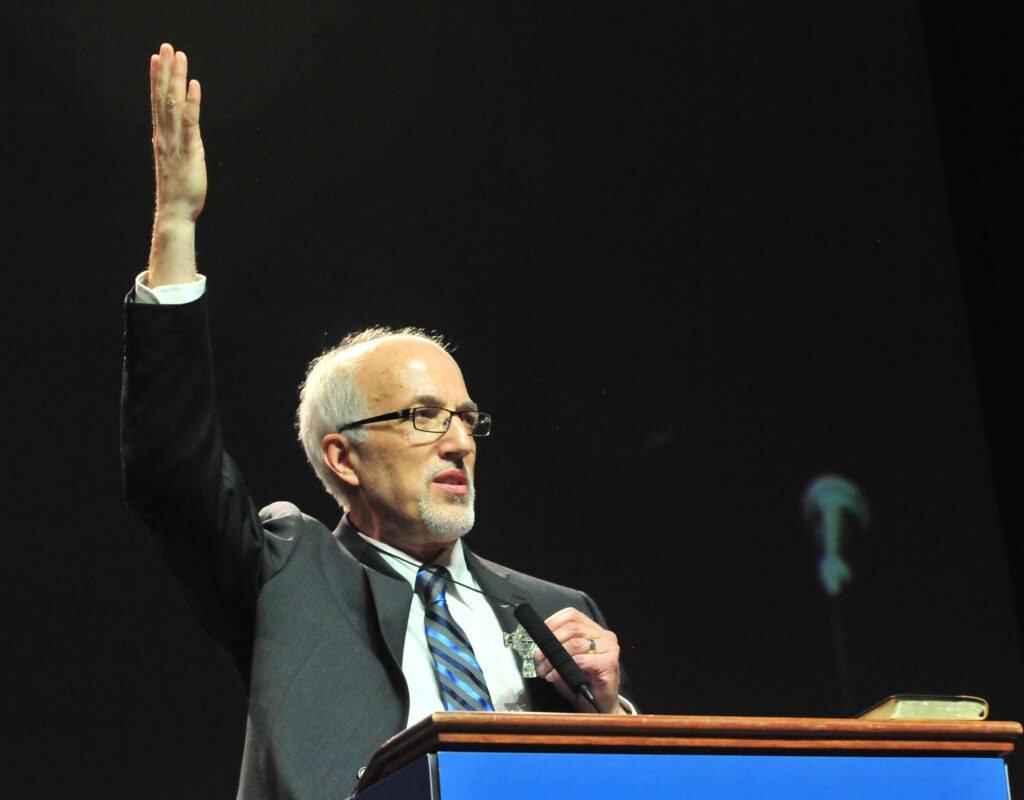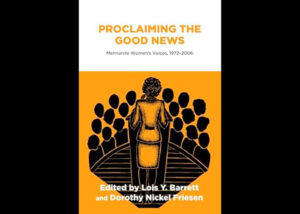Love for neighbour is absolutely central to the gospel, speaker Bruxy Cavey said in the final mass worship service of Pennsylvania 2015, July 25, 2015. This service saw the passing of a symbolic shepherd’s staff from Mennonite World Conference president Danisa Ndlovu to incoming president Nelson Kraybill.
In a reflection laced with humor on Galatians 5:22-23, Cavey––teaching pastor at the Meetinghouse, a large Brethren in Christ church in Ontario, Canada––praised Anabaptists for carrying the simple, clear message of Jesus through the centuries: that love for others is an essential reflection of love for God.
“We are a peace church because we are first and foremost a Jesus church. We care about justice because we care about Jesus. We care about reconciliation, and we care about the word of God in print, because we want to get to know the Word of God in person,” he said.
The fruits of the Spirit listed in the theme text, he pointed out, are all reflections of the first: love. “The Spirit’s work in us is the work of love. And, to the extent that we work against love, we are working against the Holy Spirit in us; to the extent that we recognize and identify love, we will be partnering with the Holy Spirit.”
Growing up in a traditional evangelical setting, Cavey said, he’d believed his priority should be to “get my relationship with God right,” focusing on private worship, prayer, study and meditation, and only at the point of overflow would he learn to love others.
But Jesus challenged that priority, joining two commandments to love God and love neighbor as indispensable: “Don’t say you love God and not love those who are made in God’s image. It is as though Jesus knew the religious impulse in the person he was talking to would be tempted to so prioritize God that he would use religion as an excuse not to love others around us.” Seeing love of God as a sole mission can be used to justify everything from suicide bombing to burning heretics to launching wars, Cavey said.
At the less extreme end, it can seem righteous to just ignore people around us in favor of personal spiritual practice. “But Jesus says: I won’t let you get away with that. You’ve got to love God and love your neighbor as yourself. If you don’t do one, you’re a liar about the other.”
Love is more than being nice or avoiding harm, Cavey said, recalling how he used a rock to explain to his daughters that love means more than just being “nice” or avoiding harm; it means taking the initiative to do good. The rock is “not being rude, it’s not hurting anyone’s feelings. It’s just sitting there. Rocks don’t do anything bad, they just don’t do anything good. Love is going beyond the ethics of a rock.” Agape, he said, is the choice to relate to someone as valuable.
Interestingly, the rest of the New Testament never repeats the bi-directional commandment, because believers are governed by the “new” and sole commandment of John 13: to love one another. To Peter, Jesus says: If you love me, feed my sheep.
“We don’t parse out that this is worship and this is service, this is worship and this is evangelism; it’s all worship. We worship when we sing, when we pray, when we eat; when we leave this conference it’s not over, when we go home the worship continues, it goes on, it flows,” Cavey said. “Our religion is relationship; it’s worked out in how we love those around us.”
The church becomes a safe space for developing our skills for loving. Each of us, as 1 Peter 4:10 points out, is to be a faithful steward of God’s grace. It means God has given each of us someone else’s grace.
“I would encourage you to go and get your grace, and to give someone your grace,” Cavey said. “And through this giving and receiving of grace will develop our ability to love, and to love God.”
As Assembly Gathered came to a close, there was plenty of love lavished verbally as MWC general secretary Cesar Garcia praised outgoing president Danisa Ndlovu’s servant leadership for the past six years and presented him with a handsome shepherd’s staff to serve as a symbol of leadership being passed on to his successor.
Ndlovu said the assembly had given him reason to feel he had “finished well,” particularly because he was going out with a song in the “awesome” music enjoyed by more than 7,000 participants. He also paid tribute to Janet Plenert, who has served 12 years with MWC, the last six as vice-president. Both were later presented with the symbolic gift of Amish foot-washing containers.
Rebecca Osiro, the first woman to be ordained in the Mennonite Church of Kenya and a longtime representative of MWC in East Africa, was introduced as the new vice-president of MWC.
Kraybill, former president of Anabaptist Mennonite Biblical Seminary, received the shepherd’s staff from Ndlovu in a ceremony installing him as president.
Echoing Cavey’s message that loving others is at the core of our faith, Kraybill movingly recalled the aftermath of a murder of a black youth in his Elkhart church’s parking lot and how that led to a new partnership to work for peace in the neighborhood. “My prayer is that before the watching world we will get on with the work of reconciliation in this world,” he said.
The joyful service, which had been filled with the music of the Mennonite Children’s Choir of Lancaster, the Mennonite Heritage Chorale Men’s Ensemble, and many songs from American folk and blues traditions, ended with what was described “the national anthem of Mennonites in North America,” an a cappella “Praise God from Whom all Blessings Flow.” A fitting end for North America Day as participants began looking forward to the next gathering in Indonesia in 2021.
Doreen Martens attends Toronto (Ont.) United Mennonite Church and serves on the board of Canadian Mennonite. This article was written for Meetinghouse, a group of Mennonite publications.
To see the video of this session, go the PA 2015 site: http://pa2015.mwc-cmm.org/watch-live.












Leave a Reply
You must be logged in to post a comment.